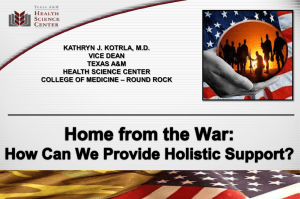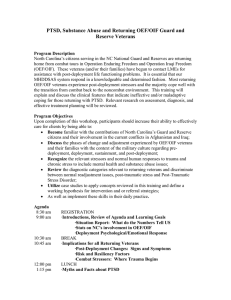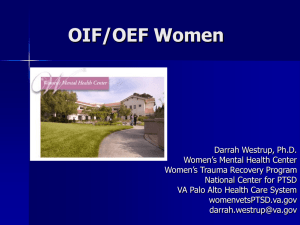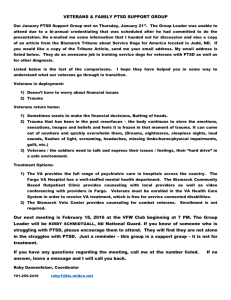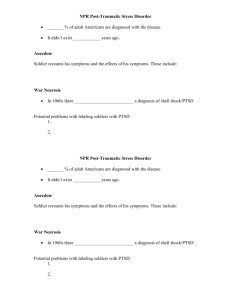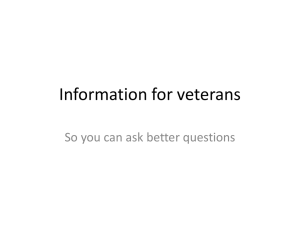RVOEC (Returning Veterans Outreach, Education and
advertisement
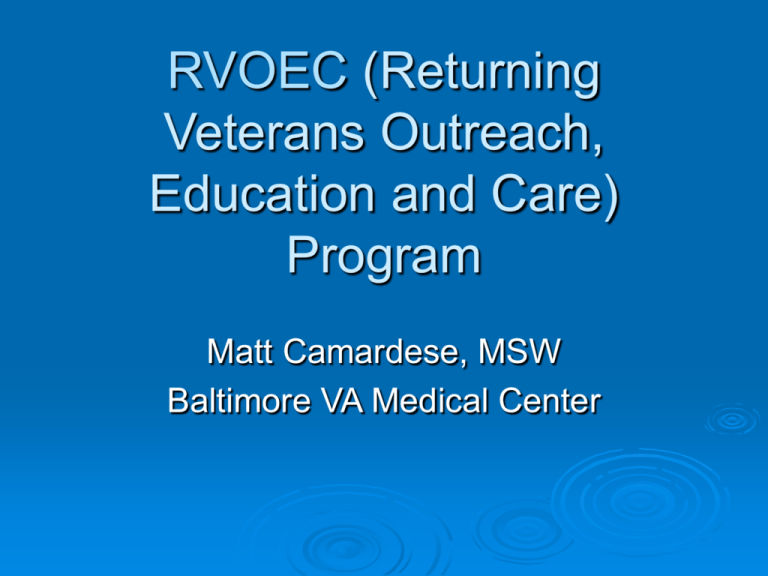
RVOEC (Returning Veterans Outreach, Education and Care) Program Matt Camardese, MSW Baltimore VA Medical Center VA Maryland Healthcare Total OIF/OEF enrolled in MD/DC (VISN 5) VA system: 11,984 Male: 75% (approx) Female: 25% (approx) 945,423 GWOT (Global War on Terror) veterans have left active duty and become eligible for VA health care since fiscal year 2002 (as of Jan 09) • 51% former Active Duty Troops • 49% Reserve and National Guard Troops Demographic Characteristics of OEF and OIF Veterans Utilizing VA Health Care % OEF/OIF Veterans (n = 299,585) Sex Male Female 88 % 12 <20 20-29 30-39 ≥40 6 52 23 19 Air Force 12 Age Group Branch Army Marine Navy 65 12 11 Unit Type Active Reserve/Guard 51 49 Rank Enlisted Officer 92 8 Common Issues 3 most common issues reported by this population (as cataloged by VA’s CPRS from encounter data from VA appts) --Diseases of Musculoskeletal System/Connective System (710-739) --Mental Disorders (290-319) --Diseases of Nervous System/ Sense Organs (320-389) Frequency of Possible Diagnoses of OEF/OIF Veterans Diagnosis (Broad ICD-9 Categories) Infectious and Parasitic Diseases (001-139) Malignant Neoplasms (140-208) Benign Neoplasms (210-239) Diseases of Endocrine/Nutritional/ Metabolic Systems (240-279) Diseases of Blood and Blood Forming Organs (280-289) Mental Disorders (290-319) Diseases of Nervous System/ Sense Organs (320-389) Diseases of Circulatory System (390-459) Disease of Respiratory System (460-519) Disease of Digestive System (520-579) Diseases of Genitourinary System (580-629) Diseases of Skin (680-709) Diseases of Musculoskeletal System/Connective System (710-739) Symptoms, Signs and Ill Defined Conditions (780-799) (n = 400,304) Frequency * % 49,272 3,988 17,274 93,028 9,677 178,483 146,611 68,295 83,771 129,656 44,812 67,384 197,078 167,959 12.3 1.0 4.3 23.1 2.4 44.6 36.6 17.1 20.9 32.4 11.2 16.8 49.2 42.0 Frequency of Possible Mental Disorders Among OEF/OIF Veterans since 2002* Disease Category (ICD 290-319 code) PTSD (ICD-9CM 309.81)+ Nondependent Abuse of Drugs (ICD 305)++ Depressive Disorders (311) Neurotic Disorders (300) Affective Psychoses (296) Alcohol Dependence Syndrome (303) Special Symptoms, Not Elsewhere Classified (307) Sexual Deviations and Disorders (302) Drug Dependence (304) Acute Reaction to Stress (308) * ** + ++ Total Number of GWOT Veterans** 59,838 48,661 39,940 31,481 22,216 9,878 5,802 5,577 4,447 3,721 Note – These are cumulative data since FY 2002. ICD diagnoses used in these analyses are obtained from computerized administrative data. Although diagnoses are made by trained healthcare providers, up to one-third of coded diagnoses may not be confirmed when initially coded because the diagnosis is “rule-out” or provisional, pending further evaluation. A total of 120,049 unique patients received a diagnosis of a possible mental disorder. A veteran may have more than one mental disorder diagnosis and each diagnosis is entered separately in this table; therefore, the total number above will be higher than 120,049. This row of data does not include information on PTSD from VA’s Vet Centers and does not include veterans not enrolled for VHA health care. Also, this row of data does not include veterans who did not have a diagnosis of PTSD (ICD 309.81) but had a diagnosis of adjustment reaction (ICD-9 309). 81% of these veterans (39,282) had a diagnosis of tobacco use disorder (ICD-9 305.1). Common Distress Responses Sleep Problems—difficulty falling asleep; staying asleep or waking early and difficulty getting back to sleep Restlessness---being jittery, fidgety or showing a high degree of nervous energy Hypervigilant—oversensitivity or anticipation about things in environment that are viewed as a threat to self/other (e.g. loud and sudden noises or movements) Social Withdrawal---Avoiding family/friends and social activities that veteran had previously enjoyed. Wanting to be alone---e.g. “Bunker” Intrusive Thoughts—memories of deployment that could be triggered by environment or feeling as if they are back in war zone. Veterans are encouraged to share with others (censored for loved ones) and seek help if sxs persist for more than 1 or 2 months More Serious Concerns Violence– Could be caused by Physical/Emotional problems and exacerbated by drugs/etoh. Violence towards self/other needs to be addressed immediately and safety plan for children/loved ones. Could be response to perceived threats, perceived betrayal, differences in expectations, or, viewed as necessary to maintain sense of safety by the veteran. Risk-Taking Behaviors—could be trying to get “rush” back, or, could be viewed as necessary to maintain safety (e.g. driving fast/rapid lane changes, carrying loaded weapon on person), sexual promiscuity, looking for fights, or “policing” environment Substance Use—Increased use of alcohol and illicit drugs, even nicotine and caffeine (energy drinks like water) causing changes in overall health and well-being and mood. Medications (e.g. opiates, benzodiazepines) could have been prescribed for injury/mood/sleep in theater and may no longer be needed. Depressed mood—guilt, sadness, numbness, feeling alone PTSD PTSD A1—exposure to traumatic event (war, sexual trauma, car accident) A2a—event involved actual threat to well-being of self/other A2b—response involved fear, helplessness or horror B: Re-Experiencing: Intrusive thoughts/memories, dreams/nightmares, feeling as if you were back in situation (flashback—true dissociation), physical sxs: rapid heart beat and sweating, getting upset when remided of trauma C: Avoidance: efforts to avoid thoughts of trauma, staying away from people/places/things that remind Pt of trauma, trouble remembering events, loss of interests, numb/detached from others, changes in future plans D: Arousal: trouble sleeping, irritability/anger, watchful/on guard, difficulty concentrating, easily startled PTSD Treatments Individual Interventions: CBT, CPT, Prolonged Exposure, Skill-Building, Supportive Therapy, Education Group Therapy: Specific groups (sleep hygiene, “HEAT,” anger mgmt) cohort groups, substance abuse & PTSD, family groups Support Groups Family Therapy: Baltimore VA partners with UMD’s Family Intervention team, specific groups for family members with and without veteran Residential Treatment: intensive residential for PTSD and Dual Diagnosis (PTSD w/ Substance Abuse) at Baltimore, Perry Point, DC, Martinsburg and Coatesville VAMC’s. Stabilization residential programs offered for aftercare, step-down and return to care. Group and Individual treatments also available for sub-threshold PTSD, or, specific sxs of PTSD Families Pay attention to behaviors and communication of veteran for any warning signs; every veteran is unique and one size does not fit all Discuss expectations, new roles and go slowly Partnership: handle barriers together and share in successes Review available literature thru VA or on web (Battlemind.org, ncptsd.va.gov, networkofcare.org, militaryonesource.com), book “Courage After Fire” available for free at many VA’s. Communicate with other families pre, during and post deployment for support and help (especially important for National Guard and Reserve members) VA clinicians available to consult with as needed and as allowed by confidentiality. Family members can help with scheduling appts. Refrain from over-reacting/pathologizing, BUT, do communicate concern and offer to help as needed Do not accept violent/disrespectful/self-destructive behavior and could be a cry for help. Use 911, ER’s and VA National Suicide Hotline: 800-273-TALK Many service members re-adjust very well and over time sxs may resolve without Tx. Others may need professional help and family members can often serve as impetus. Addressing stigma: doesn’t mean veteran is “crazy”, re-adjustment counseling should not affect security clearances as written into law (this is new; had served as barrier). Common report from veterans accessing VA Care is sense of “aloneness” OEF/OIF Outreach Clinical Reminders (Post-Deployment Screening) -Done on phone and during initial visits to identify MH concerns (PTSD, Substance Abuse and Depression), GI complaints, skin concerns, TBI, MST, Suicide risk, and general medical -Why? To identify issues early and not limited to those who come into the VA. All those enrolled in VA and identified as GWOT veteran need to be screened and VAMHCS requires above 90% completion rate at all times. OEF/OIF Outreach Post-Deployment Health Re-Assessments: Done 90 days after detachment from Active Duty. MD National Guard PDHRA’s are hosted by the Baltimore VA (1 of 3 VA Medical Centers in Nation to Host these events) PDHRA Totals (as of Sept 2008): • • • • • Events: 18 Veterans seen: 1,079 Veterans Enrolled in VA: 550 Primary Care Visits Scheduled: 339 Mental health visits Scheduled: 221 OEF/OIF Outreach Other Efforts: Annual Welcome Home Celebration (Navy Stadium 2008, Ripken Stadium 2007) Visits to Reserve and Guard Centers and Active Duty Bases Job Fairs (Northrup Gruman, Bolling AFB, Camden Yards) Visits to Demobilization Sites (Ft. Dix) Outreach Phone Calls Reintegration events with MD Guard at 30 and 60 days post-deployment Combat Call Center: direct referrals to local VA POC’s in Primary Care, Enrollment, Seamless Transition and Mental health from outreach workers Presentation at New Veteran Orientation VAMHCS Cable Show—Veterans’ Health Watch Public Service Announcements and Appearances in Local Media Outlets (Baltimore Examiner and Sun, NPR Radio, WJZ, WBFF, WBAL) In-Service presentations and advertisements at VA/DoD sites Membership in Community Veteran Committees—Balt Co, Dept of Labor, Yellow Ribbon Campaign Presentations about OIF/OEF Issues in Community: NAMI Annual Conference, AA Co Police and County Police Negotiation Teams throughout MD, Wendy’s HR, CCBC, HoCo Comm College, PG Comm College, Northrup Gruman, Maryland Psychological Association, Towson, Univ of MD, McVets Annual Conference, VISN 5 Conference Specific OEF/OIF Programs OEF/OIF Primary Care Clinic w/ behavioral health attached Women’s Health Acupuncture TBI Triage and Treatment team Seamless Transition Office Wounded Warrior program Patient Transition Advocates HUD/VASH program through Section 8 (includes case mgmt) Chronic Pain Clinic Polytrauma Team *****Returning Veterans are eligible for 5 years of free VA care for all deployment-related injuries and 180 days of free dental care from end of deployment/release from Active Duty (date from DD-214 used).******* VA Contact Information Medical Centers: Baltimore: 410-605-7000 or (800) 463-6295 (Baltimore Seamless Transition Office—(410) 605-7259) Perry Point: (410) 642-2411 or (800) 949-1003 Martinsburg: (304) 263-0811 or (800) 817-3807 Washington, DC: (202) 745-8000 or (888) 553-0242 Regional Offices (Benefits and Claims Applications): Baltimore: 31 Hopkins Plaza Baltimore, MD 21201 Phone: 1-800-827-1000 Washington, DC: 1722 I Street N.W. Washington D.C., DC 20421 Phone: 1 800 827 1000 VA Contact Information Vet Centers Baltimore: (410)-764-9400 Aberdeen: (410)-272-6771 Silver Spring: (301)-589-1073 Washington, DC: (202)-726-5212 Elkton: (410)-392-4485 Alexandria: (703)-360-8633 Cambridge: (410)-228-6305 Community-Based Outpatient Clinics (CBOC’s) Glen Burnie: 410-590-4140 Loch Raven: 410-605-7650 VA Contact Information CBOC’s, continued Ft. Howard: (410) 477-1800 or (800) 351-8387 Greenbelt: 301-345-2463 Washington, DC: 202-745-8685 Alexandria: 703-313-0694 Cambridge: 410-228-6243 or (877) 864-9611 Pocomoke: 410-957-6718 Charlotte Hall: 301-884-7102 Hagerstown: 301-665-1462 ***OEF/OIF Veterans are eligible for 5 years of FREE VA Care for all deployment-related concerns, as well as 180 days of free Dental care from the date indicated on their DD-214 (Discharge papers) RVOEC team Baltimore Division Matt Camardese, MSW 410-605-7000 ex 5732 (Loch Raven CBOC on Tuesdays) Linda Zetter, CRNP 410-605-7000 ex 5659 (Glen Burnie CBOC on Fridays) Sara Meyd, LCSW-C 410-605-7000 ex 5670 Perry Point Division Pete Allman, LCSW-C 410-642-2411 ex 6167 Christina Watlington, PhD. 410-642-2411 ex 5427 Washington, DC Division Jennifer Cho, LCSW-C 202-745-8000 ex 5912 Questions? Matt Camardese, MSW 410-605-7000 ex. 5372 Matthew.Camardese@va.gov
